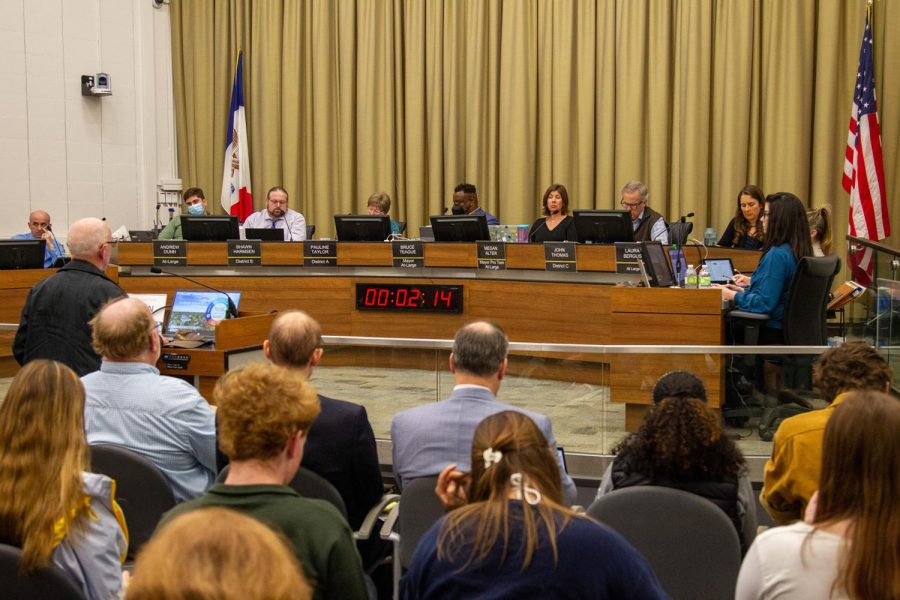IC Truth and Reconciliation Commission receives funding, timeline extension
The Iowa City City Council approved the commission’s request to hire additional consultants and an 18 month timeline extension following hours of tense debate.
The Iowa City City Council listens to community members during a meeting at City Hall on Tuesday, April 18, 2023.
May 3, 2023
Iowa City’s Truth and Reconciliation Commission will receive over $400,000 in funding and an 18 month timeline extension to complete the commission’s goals after a long debate at the city council meeting Tuesday night.
The Iowa City City Council voted 4-3 and 6-1 to approve these two items after hours of heated public comment and council discussion.
The commission, known as the TRC, was created in 2020 to help the community share their traumas related to racial injustices, facilitate healing from these instances, and suggest policy reforms based on collected testimonies of injustices within the city.
On the issue of consultant hiring, several TRC commissioners spoke at the meeting to plead with the council to allow them to hire four consultants, whose expertise they said would allow them to be more capable of completing the commission’s racial justice goals.
TRC Commissioner Clifton Johnson said this funding would give them the push and extra help the commission needs to make progress.
“I really am looking forward to getting things on the right foot. I feel like we have all the tools now, and we have the motivation to move forward to really get things done,” Johnson said. “I really hope that we can make a strong impact here in our community.”
While some councilors and community members agreed the commission needed this funding to make substantial progress, other councilors and members of the public argued they wanted to see more community engagement before allowing the money to be given to the TRC.
Previously, the city council struck down a funding request from the TRC, stating that they would like to see the commission engage more with the public before giving them funding.
Councilor Andrew Dunn, who was in support of approving the request, said the commission needs to have funding so they can adequately engage with the community.
“You are not going to be knocking on people’s doors, going out into places and meeting people where they are, without resources,” Dunn said. “I want to give you the resources that you need to get our charge, which is admittedly ambiguous, done so that our community can heal.”
Mayor Bruce Teague said he was against the funding approval not because he did not wish to see the TRC reach its goals, but because he would like to see the commission engage more with the public, especially after several community members stated they had never heard of the TRC before.
Teague also said the commission has just started to gain back trust with the community and heal from its past controversy when former chair Amel Ali was removed from the commission after saying a racial slur.
“There was a statement that was made: ‘Community-led framework moving at the speed of trust.’ The trust just started to happen between the community and the TRC members,” Teague said.
Ultimately, the TRC’s funding request passed 4-3, with Teague, Councilor Shawn Harmsen, and Councilor Pauline Taylor in opposition.
Regarding the 18 month extension of the TRC’s timeline, the council passed this item 6-1, with Taylor in opposition.
Most councilors agreed the extension was necessary regardless of their thoughts on the additional consultants because the commission simply needed more time to carry out the work they were tasked to do.
However, Taylor said she believes the commission has had long enough to carry out their duties and that an 18 month extension was too long. She said she thinks they should be able to carry out their work in 12 months instead.
“It’s already been a ridiculously long time as we’ve been discussing since the commission was first created,” Taylor said. “I just can’t in good conscience agree to 18 months.”



